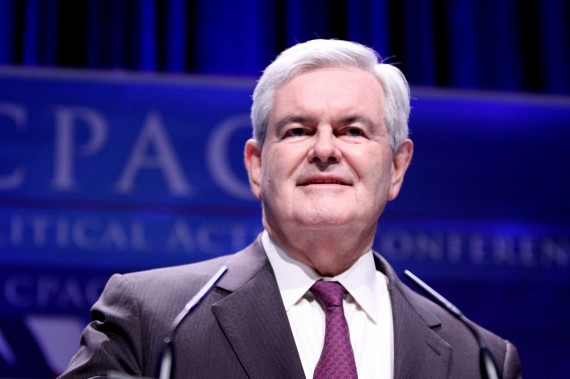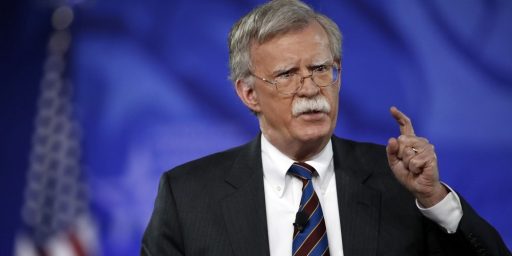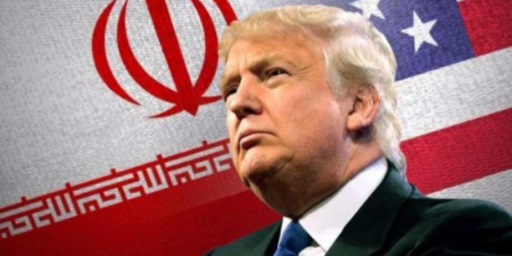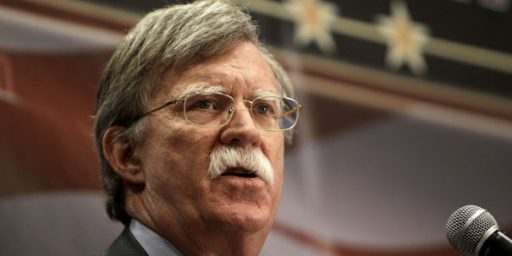Newt Gingrich’s Foreign Policy Judgment, Or Lack Thereof
Newt Gingrich's foreign policy vision leaves much to be desired.
Daniel Larison isn’t at all enamored with the idea of Newt Gingrich being in charge of American foreign policy:
Like many of his rivals, Gingrich is reliably hawkish on foreign policy, but he has the habit of framing issues in stark, apocalyptic terms that inevitably exaggerate the scale of contemporary threats. There is every reason to expect that U.S. foreign policy would become even more militarized and confrontational under a President Gingrich, and America’s relations with much of the world would deteriorate quickly.
Many Republicans flatter Gingrich by treating him as one of the party’s intellectuals, but Gingrich frequently shows that he is unable or unwilling to make crucial distinctions in his treatment of international problems. He complains on his campaign website that “we currently view Iraq, Afghanistan, and the many other danger spots of the globe as if they are isolated, independent situations,” and that America “lacks a unified grand strategy for defeating radical Islamism.” But these conflicts are largely separate from one another, and there is no such thing as a monolithic, global, radical Islamism that can be addressed by one strategy. No conflicts around the world can be properly understood except by focusing on local circumstances, but for Gingrich, the ideological emphasis on a unified global threat takes priority over proper analysis.
Larison goes on to note that Gingrich makes no distinctions when it comes to Islam as a religion and radical Islam as a motivating force for terrorism, a fact amply demonstrated by his statements last summer about the so-called “Ground Zero Mosque,” and his apocalyptic view of the regime in Iran which seems to lead to the conclusion that the only acceptable way to “deal” with Iran is to engage in the kind of war that has the potential destroy the regime. The truth, of course, is that Gingrich is hardly alone in these views inside the Republican Party. With the exception of Ron Paul, Gary Johnson, and, for the most part, Jon Hunstman, there isn’t a single Republican candidate for President that disagrees with the substance of what Gingrich says when it comes to issues like the War On Terror, Russia, China, military spending, torture, or the civil liberties implications of the War on Terror. The biggest difference seems to be that Gingrich just sounds smarter when he talks about them, largely because, as Larison notes, he is filled with a disturbingly strong sense that he, and only he, is right:
Perhaps worst of all is Gingrich’s supreme confidence in his own intellectual superiority. This means he will not be easily dissuaded from making policy on the basis of his numerous misjudgments about foreign threats and U.S. interests. A Gingrich administration promises to give America many of the misguided and harmful policies of the Bush years, but the errors will be compounded by Gingrich’s presumption that he understands the world far better than anyone else.
This seems to be even more the case once you look into who might actually make up a Gingrich Administration in the unlikely event it ever existed. Earlier this week during an appearance before the Republican Jewish Conference, for example, Gingrich said that he would ask former U.N. Ambassador John Bolton to be his Secretary of State. While this announcement is likely to only enhance Gingrich’s reputation among the GOP’s conservative base, where Bolton has something of an inexplicable cult following, it should be of concern to anyone who would hope for sound judgment at Foggy Bottom to counterbalance Gingrich’s own erratic judgment. Bolton, of course, is the Dick Cheney protege who ended up having to be given a recess appointment to his Ambassadorial post because he proved to be so controversial when first named. Bolton is also the guy famous for such quotes as this:
“While treaties may well be politically or even morally binding, they are not legally obligatory. They are just not ‘law’ as we apprehend the term. And what happens to countries when they do not adhere to international law on some matter? Usually nothing. Why, then, do we continue to talk about international ‘law’? Because the word has a strong emotive appeal.”
More recently, Bolton has made his name as a commentator on foreign policy for Fox News Channel where he seems to be viewed as the unquestioned kind of neo-conservative foreign policy. During that time, and even while he was still an Ambassador, Bolton has distinguished himself most prominently by predicting, on at least four different occasions over the course of four years, that Iran was “only weeks” away from having a nuclear program capable of producing weapons-grade nuclear material. On each occasion, of course, he has been wrong, but he’s never gotten called on it by the unquestioning anchors who sit across from him in the Fox News studios. And this is the guy that Gingrich would put in charge of American diplomacy, or so he tells the GOP base. Finally, as Andrew Sullivan notes, naming Bolton as an ideal Secretary of States essentially sends the rest of the world a message of open hostility and the message that military force is the ideal solution to most problems.
Another point to remember about Gingrich’s foreign policy is that, like his domestic policy, is the extent to which he seems willing to use to advance his own cynical evaluation of what the politically opportune position happens to be at the time. Back in March, for example, Gingrich managed to completely change his position on a No-Fly Zone over Libya over a period of only fifteen days. The only thing that changed in that time was that, in the beginning the Obama Administration was reluctant to involve American forces in what was looking like an increasingly violent civil war, only to go along with a United Nations backed plan that came into being seemingly out of nowhere. It’s fairly apparent that Gingrich was merely using Libya as an opportunity to bash the Obama Administration. He wasn’t concerned with what might actually be in the nation’s best interests, or admitting that the President had essentially done what he had called on him to do just a few weeks earlier. Someone that opportunistic is bound to do anything.







I think the only one of the candidates who could be trusted as Commander in Chief is Huntsman. While I agree with Paul and Johnson on military intervention I can see where it could be dangerous to come right out and say it.
Isn’t that the problem with Republicans in general, and Neo-Conservatives specifically?
As with the economy, where tax cuts are the answer in every conceivable circumstance, a one-size-fits-all foreign policy solution appeals to an electoral base unable, or unwilling, to think on any level that will not fit on a bumper-sticker.
People hope for greatness
Or at least some competence
But receive a newt
Even if you agree with John Bolton’s worldview, he’s still a terrible choice for secretary of state, since he’s more interested in proving he has the courage to be a dick to the rest of the world than actually advancing policy goals. If you truly think that success in Iraq was key to defeating a global Islamic threat, why would you want a guy whose actions drove away all of the other countries that had originally partnered with us there and left the US to fight almost entirely on it’s own?
Hey Norm has it exactly right. Gingrich’s foreign policy statements and his support for Bolton as Sec. of State do not distinguish him from the Republican field. They are no different than what any other candidate (other than Paul and Huntsman) would say and do.
@ponce:
–She turned me into a Newt!
-You don’t look like a Newt.
–I got better….
Well, given that Newt first became politically irrelevant before the U.S.S. Cole, much less 9/11, it’s not at all surprising that he’s out to lunch on foreign policy. There’s also the reality that he needs to throw a lot of red meat towards the GOP’s irrational and stupefied “base,” so at least some of Newt’s more inane comments probably need to be taken with a grain of salt.
The foreign policy should put US interests first. It also should have the principle that if we send soldiers off to fight, there should be a plan to win and an exit strategy. Otherwise, no wars.
Vietnam could have been won if Congress had demanded a strategy to win for it to be funded.
U.S. Republican presidential candidate Newt Gingrich thrust himself into controversy on Friday by declaring that the Palestinians are an “invented” people who want to destroy Israel.
http://www.haaretz.com/news/international/newt-gingrich-palestinians-are-an-invented-people-1.400596
Just curious, but what might that strategy have been?